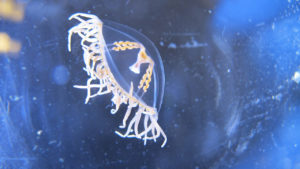
The researchers uncovered a genetic match between populations of clinging jellyfish in the Vladivostick, Russia-area and those found along the U.S. East Coast (above) in the Northwest Atlantic. (Annette Govindarajan, Woods Hole Oceanographic Institution)
WOODS HOLE – Interest in the study of clinging jellyfish has renewed in the region over recent years after stings that result in severe pain, and respiratory and neurological symptoms began occurring on Cape Cod and nearby waters.
The small jellyfish, which attach themselves to seagrasses and seaweeds, are found along coastlines in the Pacific and Atlantic Oceans, particularly in waters near Vladivostok, Russia.
The first genetic study of the diversity of the populations around the world has discovered links between distant communities and revealed there may be more than one species.
The study, which was led by Woods Hole Oceanographic Institution biologist Annette Govindarajan, aims to trace the species’ origin of the East Coast of the U.S.
Researchers uncovered a genetic match between populations in Russia and those found on the East Coast and the Northwest Atlantic.
The study also found that there were seven different variants, some specific to one location and others shared among distant communities.
In the future, researchers are hoping to study the relationship between the different variants and their toxicity.





















